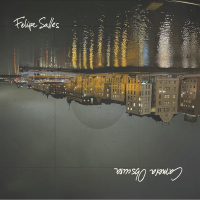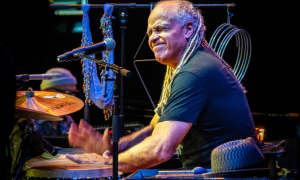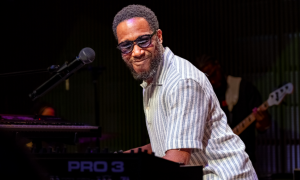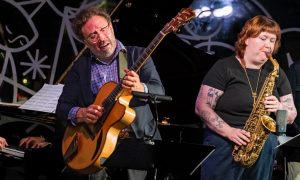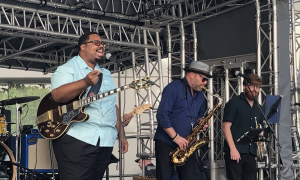Home » Jazz Articles » Live Review » Brilliant Corners 2018
Brilliant Corners 2018

[Music] changes people. It changes societies. It makes people have hope, vision and inspiration©Call those things that make you feel good about life and breathing. ThatĪ»s why itĪ»s so, so important that we donĪ»t reduce the arts funding©Cwe triple it.
—Brian Irvine, composer, conductor
Black Box
Belfast, N. Ireland
March 3-10, 2018
Compared to Dublin or cities in the UK, Belfast is usually overlooked when jazz groups tour. When the likes of

Wayne Shorter
saxophone1933 - 2023

Charles Lloyd
saxophoneb.1938

Ahmad Jamal
piano1930 - 2023

Keith Jarrett
pianob.1945

Brad Mehldau
pianob.1970

Pat Metheny
guitarb.1954
In recent times actual tours have seen Laura Jurd's Dinosuar and the

Trish Clowes
saxophoneBelfast boasts a host of great small, medium and contemporary arena-sized venues of every imaginable character that over the years have hosted Bob Dylan, The Beatles, The Rolling Stones, Jimi Hendrix, Pink Floyd, Pavarotti and, back in the day, even Laurel and Hardy. In wretched political times Led Zeppelin, AC/DC, U2, Elton John, Sting and David Bowie all played here. Since those times Radiohead, Bruce Springsteen, Neil Young and Kraftwork, for example, have all graced the city.
Jazz, on the other hand, at least outside the parameters of the long-running Belfast International Arts Festival, is not on most people's radars. That began to change in 2013 when Moving On Music, steered by veteran promoter Brian Carson, launched Belfast's one and only jazz festival—Brilliant Corners. Adventure and surprise have been the watchwords of the festival from its inception and the 6th edition was no exception.
In previous years Brilliant Corners has toggled between several venues but this year every concert bar one lunch-time free concert was held in Black Box, an outstanding seven-days-a-week venue in the heart of the city's vibrant Cathedral Quarter. This shift makes sense, for multiple venues only really appeal when a festival runs from morning to night, the journeying between them revealing different aspects of a city's character and adding to the festive experience.
There were day-time workshops, several jazz-related films shown in The Bean Bag cinema and one much-lauded solo concert by

Kaja Draksler
pianob.1987
Day One
A.R.C./Blue WhaleWith promoters Moving On Music there's often more bang for your bucks and Brilliant Corners 2018 began with the previously unannounced performance of A.R.C.—a Belfast improvisational trio fusing electronic and acoustic sounds. Double bassist Chris Allen bowed profundo drone, Barry Cullen conjured DIY electronic sounds and drummer Saul Rayson worked his kit in orthodox and less orthodox manner, moving from sticks to bowed snare, while employing a Eurorack synth to generate effects. Drone and siren calls formed a constant backdrop, though Rayson's shifting rhythmic pulses ensured the music never drifted into shoe-gazing ambient terrain. Some of the subtleties of his brushwork, however, were lost in the power of the collective voice.
Occasionally, bass ostinato emerged, with Allen orchestrating his pedals to effect what seemed like real-time sampling, creating layers of overlapping sound. Not content to rest on a groove or fixed pattern, the trio forayed into a an extended passage of electronic improvisations—an abstract sci-fi adventure that, between those transfixed to the spot and those in close proximity to the bar, left no-one in Black Box sitting on the fence.
Blue Whale
Blue Whale was billed as a jazz-punk band and there was certainly plenty of bullish energy and fiery improvisation about the Belfast quartet. The dual guitars of Michael O'Halloran and Ben Behzadafshar wove angular, mathy lines over bassist Andrew Melville and drummer John Macormac's punchy grooves. At its most complex the heady brew evoked Discipline-era King Crimson on speed, punctuated by explosions of punkish anarchy. Solos were rationed, with Blue Whale's compositions rarely stretching the three- minute mark. Surprisingly, despite the concert lasting barely fifty minutes, it felt very much like less was more. After all, how many pulsating two or three-minute instrumentals can a person absorb before they all blur into one? A festival band if ever there was one.
In bygone days, flutists, pipers and drummers would lead armies into battle; if Blue Whale spear-headed the attack, then all foes would surely fall away, or else fall under the spell. Potent stuff.
Day Two
Ronnie Greer Organ Trio featuring Jim MullenThe Saturday and Sunday afternoon gigs have proved highly popular in recent editions of Brilliant Corners and there was nothing that The Beast From the East—the colourfully titled Siberian weather front whose snow and ice brought large parts of the country to a standstill—could do to stop the faithful turning up for " data-original-title="" title="">Ronnie Greer's searing blues sermon.
Greer, the doyen of Irish blues guitar, was joined by special guest

Jim Mullen
guitarb.1945

Dick Morrissey
saxophoneb.1940

Jimmy Witherspoon
vocals1923 - 1997

Gary Husband
drumsb.1960

Claire Martin
vocalsb.1967
Stan Sulzman
b.1948
Mose Allison
piano and vocals1927 - 2016

Scott Flanigan
pianoDominic Mullan
drumsGreer and Mullen's respective blues and jazz idioms dovetailed beautifully on a set that ran from easy swing (Toots Thielmans's "For My Lady") and caressing ballads (Don't Go to Strangers") to samba-laced grooves (Bruno Martino's "Estate") and intimate duets ("Stompin' at the Savoy"). The two guitarists traded solos liberally, Mullen's jaw-dropping fluidity referencing his primary influences—

Wes Montgomery
guitar1923 - 1968

George Benson
guitarb.1943

Charles Mingus
bass, acoustic1922 - 1979
No less impressive was Flanigan. Fresh from his Take 5 residency—a project run by Serious to help stimulate the careers of promising jazz talent—the organist proved a first rate accompanist and an impassioned soloist, notably on the Gershwins' "Summertime," where his fiery Hammond organ-esque improvisation stirred memories of Brian Auger— with whom Mullen played in the early 1970s—in his heyday.
Original takes on Earth Wind and Fire's "After the Love Has Gone" and Bobby Hebb's "Sunny" added to a varied set. A rousing version of

Sonny Rollins
saxophoneb.1930

Linley Hamilton
trumpetb.1965
Day Three: Irish Showcase
The Irish showcases coincided with a visit from members of the Jazz Promotions Network, a body representing eighty organisations from across the UK and Ireland. The JPN aims to build audiences for jazz, provide opportunities for musicians and promoters, co-commission projects and tours, and in general, to advocate for jazz—and related music—nationally and internationally.Joseph Leighton Trio
Derry guitarist

Joseph Leighton
guitar, electricConor Murray
bass, acoustic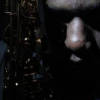
James Anderson
violin
Jack Kelly
bass, acousticSue Rynhart
Though Sue Rynhart has played a number of jazz festivals, including a memorable performance at Bray Jazz Festival 2016, the fact is that it's no easy task trying to stick her music in a box. As this performance demonstrated jazz is indeed one part of the mix, but there are so many more colors to Rynhart's palette. Bassist
Dan Bodwell
bass
Francesco Turrisi
pianob.1977
The Paul Dunlea Group
Cork trombonist
Paul Dunlea
trombone
Marshall Gilkes
tromboneb.1978

Taylor Eigsti
piano
Cassandra Wilson
vocalsb.1955

Peter Washington
bassb.1964

Lewis Nash
drumsb.1958

Billy Drummond
drumsb.1959
Drummer
Alyn Cosker
drumsBarry Donohue
bass
Leopoldo Osio
pianob.1985
At its most intimate Dunlea's music swayed between achingly lyrical and melodically uplifting, with the transitions to more robust ensemble passages building gradually but surely, like day following night. The final tune, a post-bop burner of sure rhythmic compass and stirring solos—no less so than from the continually inventive Cosker—set the seal on an impressive set. Dunlea is undoubtedly an assured trombonist, but perhaps his greatest strength lies in his composing, while his main instrument is arguably the ensemble he writes for— which in this case was most persuasive.
Day Three
ThunderblenderThunderblender is a Belgian-based trio led by Dubliner
Sam Comerford
saxophone, tenor
Chris Guilfoyle
guitar
Matthew Jacobson
drumsFlanked by pianist
Hendrik Lasure
pianob.1997
The energized "Bozza" fairly catapulted out of the blocks, with bass-synth, mini shakers and electronic soundscaping adding subtle contemporary textures. Stabbing piano chords and fractured drum rhythms framed Comerford's tenor excursion, which grew from meandering and melodious to searing. Comerford's bass saxophone riffed its way through the body of "Last Minute Panic," the spare compositional framework inviting spiky free improvisation, with piano and drums to the fore; a slower, hazily lyrical passage stretched out into a trance-inducing, lulling coda.
"Toetje" swayed between mellifluous balladry and slow-burning funk while the set-closer "Kwakzalver" saw the trio embrace a more angular, punchy symmetry. With signature evasion of the predictable, Thunderblender changed down and then up gears with alluring logic. This was a compelling performance from an original trio whose sense of adventure should take it far.
Elliot Galvin Trio
With the albums Dreamland (Chaos Collective, 2014) and Punch (Edition Records, 2016)

Elliot Galvin
pianoTom McCredie
bass, acoustic
Corrie Dick
drumsb.1990
The facility with which the opening brace of "New Model Army" and "Lobster Cracking" morphed from classically influenced realms to electro-pop and knotty jazz—often fusing elements of all—was impressive. Rhythmically fractured then charging, what might have seemed disjointed on first impression revealed itself over time as a fascinating mosaic of ideas— reflecting perhaps the eccentricity, paranoid schizophrenia and manic drive of Tilly-Matthews. From the beautifully elegiac, baroque-influenced "Bees, Dogs and Flies" to the psychedelia-cum-high-life fantasy of "Planet Ping Pong" the trio rode a rollercoaster of thrilling virtuosity, off-beat humor and atmospheric soundscaping.
By contrast, the slow-burning gravitas of "Society of Universal Harmony" provided a more profoundly meditative mood before Galvin seized the bull by the horns, embarking on a highly charged improvisation of breathless scope before unlashing a thumping vamp. A strong performance concluded with "Boys Club," where re-wired toys and electronica combined with electric guitar in a motley fusion of skewed classical and alt-rock experimentation, petering out in a soundscape of gentle sci-fi bleeps and pips.
Galvin, at the head of a trio that sounds like no other, is rapidly developing into one of the most adventurous pianists/composers on the wonderfully fertile UK jazz scene. It's to Brilliant Corners credit that it consistently programmes such forward-thinking artists, challenging and rewarding its audiences in equal measure with the sound of surprise.
Day Four
Brian Irvine EnsembleRoman Mints (violin); Kate Ellis (cello); James Allsopp (saxophones/clarinets); Richard Mawhinney (saxophone); Kevin Lawless (saxophone); David Liddell (trombone); Alex Bonney (trumpet); Matthew Bourne (piano); Phil Smyth (electric bass); Bill Campbell (electric guitar); Stephen Davis (percussion); Andrew Lavery (percussion); Brian Irvine (conductor, composer).
Multi-faceted composer extraordinaire Brian Irvine had the crowd in its pocket from the moment he led his thirteen-piece ensemble through the crowd to the stage, wordlessly singing Wayne Hill's glorious tune "Left Bank Two"-much loved by British TV audiences from the 1960s-1980s. Playing its first gig in almost a decade, Irvine conducted fiendishly complex charts that tested the ensemble's metal—not to mention the audience's capacity to follow the thread.
At the end of 2017 Moving On Music hosted the Instant Composer's Pool at The MAC, and echoes of its blend of jazz precision and comedic anarchy were present in the Brian Irvine Ensemble's performance. So too, raucous

Captain Beefheart
vocals1941 - 2010

Frank Zappa
guitar, electric1940 - 1993
Off-kilter tango and New Orleans-tinged country-and-western parody rubbed shoulders with orchestral jazz passages of, in turn, great lyricism, meaty grooves, and iconoclasm of the most celebratory nature—steered by Irvine's exuberant, unorthodox conducting. With wicked mischief in his eyes, Irvine invited the audience to write out graphic music notations on sheets of A4, which he displayed with barely disguised glee to the audience before unleashing them on the unsuspecting ensemble. A series of squiggly lines, random dots, symbols, equations and pictures that made

Wadada Leo Smith
trumpetb.1941

Anthony Braxton
woodwindsb.1945
Mid-gig Irvine made an impassioned defence of music and the arts in general at a time when funding cuts are the norm. "Music is way of communicating, it's a way of sharing what it's like to be a human being. It changes people. It changes societies. It makes people have hope, vision and inspiration—all those things that make you feel good about life and breathing. That's why it's so, so important that we don't reduce the arts funding—we triple it."
The madcap caper that was "Melon Head" sounded a helter-skelter warning to those who watch too many cartoons, while the episodic avant-garde circus romp "Oyster Boy" drew the curtain—with extended theatricality—on a splendidly animated concert from a sensational contemporary ensemble bursting with color, imagination, humor and passion. A standing ovation rightly ensued that accompanied the musicians on the return journey back through the audience from whence they came. Hopefully this appearance at Brilliant Corners will be the catalyst for more sustained activity from the Brian Irvine Ensemble—a fearless group that would enliven any festival, club or concert hall.
Day Six
Jack Kelly TrioWith a few notable exceptions Northern Ireland hasn't produced an abundance of talented jazz musicians in recent decades. However, thanks to schemes by leading Belfast arts venue The MAC and promoters Moving On Music a number of promising musicians have been given a boost in the last couple of years and mentorship schemes have set the wheels in motion to give a leg up to more hopefuls in the years to come. Bassist Jack Kelly, pianist Caolan Hutchinson and drummer Jake Holmes are three such young, rising stars, so it was satisfying to see this trio—making its debut—on the Black Box stage in front of an attentive and appreciative audience.
A set of standards was perhaps to be expected, but there was much to admire in the trio's delivery. There was bluesy soul in Frank Loesser's "If I Were a Bell," the trio's space and touch reminiscent of

Oscar Peterson
piano1925 - 2007

Ahmad Jamal
piano1930 - 2023

John Coltrane
saxophone1926 - 1967

Gigi Gryce
saxophone1927 - 1983

Hampton Hawes
piano1928 - 1977
David Lyttle Trio
Drummer, composer, record label owner, educator and podcaster,

David Lyttle
drumsb.1984

Andreas Varady
guitarb.1997

Kurt Rosenwinkel
guitarb.1970

Michael Janisch
bassb.1979
For this Black Box gig Janisch and pianist
Steve Hamilton
piano
Joe Lovano
drumsb.1952
Lyttle's hands worked his kit on the introduction to "After the Flood," reverting to sticks to effect a samba-tinged rhythm as Hamilton's sweeping melodicism held sway. Lyttle's solo spot, with elbows, hands and sticks skilfully balanced gutsy attack and melodic finesse. American-born, Carrickfergus-based

Meilana Gillard
saxophone, tenorb.1981
Janisch featured on another impressive Lyttle tune, "Summer Always Passes," and though his unaccompanied, highly melodious intro held the audience rapt, it was the trio's dialogue when fully locked on that was most captivating. A fine set wound up with "The Pensioner," an elegant piano-driven number punctuated by a drum feature, Lyttle working his kit with power and precision. How often this trio will get together remains to be seen but the association is definitely one worth pursuing.
Sons of Kemet
Brilliant Corners 2018 finished off in properly celebratory style, with a booty-shaking powerhouse of a concert by the much-lauded Sons of Kemet. The multiple-award- winning quartet has been a festival favourite since

Shabaka Hutchings
woodwindsSons of Kemet hasn't stood still since its debut Burn (Naim Jazz Records, 2013) , as this set, drawn largely from the band's third release, the cheekily titled Your Queen Is a Reptile (Impulse!, 2018), showed. The dual drum set-up of
Eddie Hick
drums
Tom Skinner
drums
Theon Cross
tubaThe crowd, pressed close to the stage, moved to the hypnotic beats from the outset, with more and more drawn to dance as the concert progressed. Caribbean roots music, heavy dub, futuristic funk, New Orleans second-line and free-jazz fused in a wildly euphoric fusion that was trance-like in its unrelenting intensity. At an hour and fifteen minutes this was, relatively speaking, a short headlining set, but trying to sustain music this potent, this explosive, or trying to dance to it for that long, rendered it something of a marathon experience—and an unforgettable one at that. Unlikely to be the party band at England's upcoming royal wedding, but highly recommended for all other festive occasions.
Wrap-up
The best edition of Brilliant Corners so far? Such things are subjective but promoter Moving On Music does seem to keep on raising the bar. For the stylistic range and quality of music on offer, and for the adventurous nature of the programming, which often seems to say 'let's see what they think of this,' Brilliant Corners is arguably more progressive than many bigger and more illustrious jazz festivals. Still with the potential to grow its audience, there will be many, no doubt, who feel that the one main venue—with the odd satellite concert—and the intimate nature of Brilliant Corners is precisely its forte. An essential event in Ireland/Belfast's packed festival calendar.Photo Credit: Courtesy of Marcin Wilkowski
Tags
Comments
About Sons of Kemet
Instrument: Band / ensemble / orchestra
PREVIOUS / NEXT
Support All About Jazz
 All About Jazz has been a pillar of jazz since 1995, championing it as an art form and, more importantly, supporting the musicians who make it. Our enduring commitment has made "AAJ" one of the most culturally important websites of its kind, read by hundreds of thousands of fans, musicians and industry figures every month.
All About Jazz has been a pillar of jazz since 1995, championing it as an art form and, more importantly, supporting the musicians who make it. Our enduring commitment has made "AAJ" one of the most culturally important websites of its kind, read by hundreds of thousands of fans, musicians and industry figures every month.
Go Ad Free!
To maintain our platform while developing new means to foster jazz discovery and connectivity, we need your help. You can become a sustaining member for as little as $20 and in return, we'll immediately hide those pesky ads plus provide access to future articles for a full year. This winning combination vastly improves your AAJ experience and allow us to vigorously build on the pioneering work we first started in 1995. So enjoy an ad-free AAJ experience and help us remain a positive beacon for jazz by making a donation today.

Belfast
Concert Guide | Venue Guide | Local Businesses
| More...
Belfast Concerts
Jan
31
Sat
High Fade
Mandela Hall
Belfast, UK
Feb
24
Tue
Grandbrothers
Mandela Hall
Belfast, UK

Belfast
Concert Guide | Venue Guide | Local Businesses | More...High Fade
Mandela HallBelfast, UK
Grandbrothers
Mandela HallBelfast, UK






 Buy Now
Buy Now





